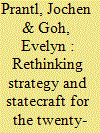|
|
|
Sort Order |
|
|
|
Items / Page
|
|
|
|
|
|
|
| Srl | Item |
| 1 |
ID:
106425


|
|
|
|
|
| Publication |
2011.
|
| Summary/Abstract |
This article addresses the problem of global norm diffusion in international relations with particular reference to the implementation of 'the responsibility to protect' (R2P) in East Asia. Exposing the limits of previous work on norm localization, we develop the framework of the norm diffusion loop. Rather than understanding norm diffusion as a linear top-down process, we demonstrate that the reception of R2P has evolved in a far more dynamic way that can best be described as a feedback loop. We first look into the processes and causal mechanisms that helped to construct R2P as an emerging transnational soft norm; then we analyse the challenges of diffusing R2P from the global to the regional and domestic levels; and, finally, we examine the variation of norm effects within the same region across states, investigating in particular how R2P has shaped Chinese and Japanese policy responses respectively.
|
|
|
|
|
|
|
|
|
|
|
|
|
|
|
|
| 2 |
ID:
066352


|
|
|
| 3 |
ID:
147637


|
|
|
|
|
| Summary/Abstract |
There is scepticism about whether a state like Australia can secure its interests and exercise influence on the United Nations Security Council (UNSC). A case study of Australia’s experience as a UNSC member in 2013–2014 shows that it directly influenced UNSC decision-making in a number of ways: first, in the response to the MH17 incident; second, pushing forward UNSC practice through the first-ever resolutions on both ‘small arms and light weapons’ and police in peacekeeping; and third, as chair of three sanctions committees, influencing the decision-making environment towards greater transparency. While Australia did not achieve all its objectives, it made its views well-known. A second case study demonstrates that Australia’s opportunities to influence UNSC decision-making are not limited to stints of membership. Australia was able to achieve many of its foreign policy objectives in East Timor in 1999 through strategically engaging with key UNSC players through an informal diplomatic grouping: the Core Group on East Timor. Both case studies show that Australia’s diplomatic engagement with the UNSC is desirable, necessary and strategic, whether or not it is a current or prospective member.
|
|
|
|
|
|
|
|
|
|
|
|
|
|
|
|
| 4 |
ID:
184956


|
|
|
|
|
| Summary/Abstract |
Today's most pressing security and policy challenges—great power conflict, economic interdependence, peacebuilding, climate change and other non-traditional threats such as pandemics—are all complex problems. Hyperconnectivity, power diffusion and radical technological transformation are significantly shrinking the policy space available to governments and other international agencies in what has been called the twenty-first century of complexity. Thus, the practice of statecraft requires accentuated strategic rationale: clear emphasis on big-picture and longer-term purposes and priorities. While effective strategy is essential for mobilizing power and winning strategic contests, effective diplomacy is necessary for garnering support for the strategy. This article contributes to stepping up to this challenge in three innovative ways. First, it utilizes key insights from complex adaptive systems thinking to recast the conceptual underpinnings of power, strategy and statecraft. Second, the article advances a ‘strategic diplomacy’ diagnostic and policy framework to maximize policy space in dealing with complex systems problems in international affairs. And third, by applying the framework to three significant international policy challenges, the article demonstrates the utility and implications of the ‘strategic diplomacy’ framework for strategic policy in the twenty-first century.
|
|
|
|
|
|
|
|
|
|
|
|
|
|
|
|
| 5 |
ID:
135268


|
|
|
|
|
| Summary/Abstract |
This article develops the argument that informal institutions—‘G-x groupings’, ‘contact groups’, ‘core groups’—provide a vital space to renegotiate the terms and conditions of US hegemony. With the global balance of power shifting, US hegemony today is no longer seen as the exclusive framework to solve urgent collective action problems—major armed conflict, nuclear non-proliferation, climate change, global financial stability. These problems are of global significance and litmus tests for two key properties of US hegemonic power: the ability to maintain order and to provide public goods. As the global financial crisis of 2008 has demonstrated, emerging powers consider US hegemony as part of the problem rather than the framework through which to develop solutions. The substantial challenges for liberal institutions to adapt to major shifts in the global distribution of power and to act as effective problem-solvers has led to growing recourse to alternative mechanisms of collective action that operate in and around the liberal institutional architecture. However, they are not the convenient support structure for the renegotiation of Western liberal order on exclusive US terms. Informal institutions are platforms for contestation with an open outcome. Contestation includes the possibility of developing new patterns and understandings that may ultimately replace Western liberal order. The social contract between hegemonic leader and followers can be revoked. The contract will be up for termination if there is a widely shared belief that the hegemon fails to deliver sufficient public goods and proves to be incapable of performing its system maintenance functions
|
|
|
|
|
|
|
|
|
|
|
|
|
|
|
|
|
|
|
|
|